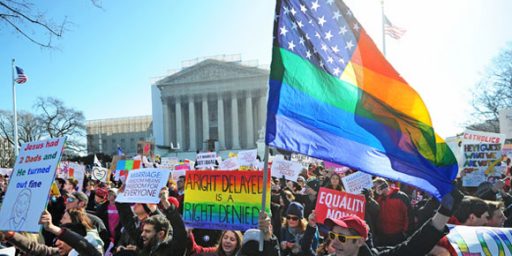Supreme Court To Hear Appeals In Two Same-Sex Marriage Cases
The issue of same-sex marriage will be before the Supreme Court early next year.
The Supreme Court announced today that it had accepted appeals in two cases dealing with same-sex marriage, including one that deals with the Constitutionality of Section Three of the Defense Of Marriage Act:
WASHINGTON — The Supreme Court announced on Friday that it would enter the national debate over same-sex marriage, agreeing to hear a pair of cases challenging state and federal laws that define marriage to include only unions of a man and a woman.
One of the cases, from California, could establish or reject a constitutional right to same-sex marriage. Another case, from New York, challenges a federal law that requires the federal government to deny benefits to gay and lesbian couples married in states that allow such unions.
The court’s move comes against the backdrop of a rapid shift in public attitudes about same-sex marriage, with recent polls indicating that a majority of Americans support allowing such unions. After last month’s elections, the number of states authorizing same-sex marriage increased by half, to nine.
The court’s docket is now crowded with cases about the meaning of equality, with the new cases joining ones on affirmative action in higher education and the future of the Voting Rights Act of 1965. Decisions in all of those cases are expected by June.
The new California case, Hollingsworth v. Perry, No. 12-144, was filed in 2009 by Theodore B. Olson and David Boies, two lawyers who were on opposite sides in the Supreme Court’s decision in Bush v. Gore, which settled the 2000 presidential election. The suit argued that California’s voters had violated the federal Constitution the previous year when they overrode a decision of the state’s Supreme Court allowing same-sex marriages.
A federal judge in San Francisco agreed, issuing a broad decision that said the Constitution required the state to allow same-sex couples to marry. The decision has been stayed.
A divided three-judge panel of the United States Court of Appeals for the Ninth Circuit, also in San Francisco, affirmed the decision. But the majority relied on narrower grounds that seemed calculated to avoid Supreme Court review or, at least, attract the vote of the presumed swing member of that court, Justice Anthony M. Kennedy.
Judge Stephen R. Reinhardt, writing for the majority, relied heavily on a 1996 majority opinion from Justice Kennedy in Romer v. Evans, which struck down a Colorado constitutional amendment that had banned the passage of laws protecting gay men and lesbians. The voter initiative in California, known as Proposition 8, had done something similar, Judge Reinhardt wrote.
That reasoning, he added, meant that the ruling was confined to California.
“We do not doubt the importance of the more general questions presented to us concerning the rights of same-sex couples to marry, nor do we doubt that these questions will likely be resolved in other states, and for the nation as a whole, by other courts,” he wrote.
“For now,” he said, “it suffices to conclude that the people of California may not, consistent with the federal Constitution, add to their state Constitution a provision that has no more practical effect than to strip gays and lesbians of their right to use the official designation that the state and society give to committed relationships, thereby adversely affecting the status and dignity of the members of a disfavored class.”
The Supreme Court has several options in reviewing the decision. It could reverse it, leaving California’s ban on same-sex marriage in place unless voters there choose to revisit the question. It could affirm on the narrower theory, which would allow same-sex marriage in California but not require it elsewhere. Or it could address the broader question of whether the Constitution requires states to allow such marriages.
The second case the court agreed to hear, United States v. Windsor, No. 12-307, challenges a part of the Defense of Marriage Act of 1996. Section 3 of the law defines marriage as between only a man and a woman for purposes of more than 1,000 federal laws and programs. (Another part of the law, not before the court, says that states need not recognize same-sex marriages from other states.)
The case concerns two New York City women, Edith Windsor and Thea Clara Spyer, who were married in 2007 in Canada. Ms. Spyer died in 2009, and Ms. Windsor inherited her property. The 1996 law did not allow the Internal Revenue Service to treat Ms. Windsor as a surviving spouse, and she faced a tax bill of some $360,000 that a spouse in an opposite-sex marriage would not have had to pay.
Ms. Windsor sued, and in October the federal appeals court in New York struck down the 1996 law. The decision was the second from a federal appeals court to do so, joining one in May from a court in Boston. The New York decision was the first from a federal appeals court to say that laws treating same-sex couples differently must be subjected to heightened judicial scrutiny.
The Windsor case made its way the Supreme Court unusually quickly because the parties had filed an appeal from the trial court’s decision in the case, also striking down the law, even before the appeals court had ruled.
In both cases, however, the Court also gave itself something of an out that, at least in theory, would preclude them from having to rule on the merits.
In the Proposition 8 case, Hollingsworth v. Perry, in addition to agreeing to hear the case on the merits, the Court is also asking both sides to brief the question of whether the group that is defending the constitutionality of the law has standing to do so under Article III of the Constitution. As you may recall from the procedural history of this case, when Jerry Brown became Governor of California and Kamala Harris became Attorney General, they announced that they would not defend Proposition 8 on appeal because they believed it to be unconstitutional. As a result, the task of defending the case fell to a group of “traditional marriage” advocates, including some California Republicans. Initially, the 9th Circuit Court of Appeals was unclear on the question of whether this group had standing to appeal the case at all and remanded the matter to the California Supreme Court for a ruling on whether or not anyone other than the Governor and Attorney General could defend the Constitutionality of a state law in court. The California Supreme Court ruled that they did have such authority, and the 9th Circuit then proceeded to rule on the merits of the case by striking the law down as had happened at the District Court level. If the Court finds that this group does not have Constitutional standing to defend the law, then the 9th Circuit’s ruling would stand and same-sex marriage would be legal in California, but the decision would have little impact outside of the state of California because of the narrow decision.
In the DOMA case, United States v. Windsor et al, the Court accepted the case on the merits, but also asked both sides to brief the question of whether the Bipartisan Legal Advisory Group of the United States House of Representatives has standing to defend the Defense of Marriage Act in Court. As you will recall, in February of last year the Obama Administration announced that it would not defend the constitutionality of the Defense of Marriage Act because it believed the law, at least Section Three of the law, to be unconstitutional. As I noted at the time, while the decision created much ire on the right, the act was not entirely unusual because previous President’s had done exactly the same thing. Typically, the practice in such cases has been for Congress to employ outside counsel to defend the law, and that’s what happened in this case. To my knowledge, the propriety of this arrangement has never really been seriously questioned by the Federal Courts in the past, although I’m not certain that a case where the Justice Department had declined to provide a defense has reached the Supreme Court before.
To be honest, I find it less likely that the Court will use the standing argument to punt on the DOMA case largely because doing so would mean that the ruling in Windsor and all the other Federal cases where DOMA Section 3 has been found unconstitutional would stand and we’d end up with a situation where a provision of Federal Law was valid in some parts of the country and invalid in others. They may not even do it in the Proposition 8 case, although it would certainly be the easy way out of issuing a ruling that would threaten to become the Roe v. Wade of same-sex marriage. However, I find it interesting that they have decided to specifically ask that both of these issues be briefed when they didn’t have to. Of course, it’s worth remembering that we had a similar development in the Obamacare cases when the Court asked the parties to brief the Anti-Injunction Act argument and then ended up rejecting the argument that the Act barred any lawsuit until a tax had been assessed unanimously. That may happen here as well so, as always, it’s best to be cautious in trying to read the tea leaves.
These will be the first gay rights cases that the Court has heard since 2003’s Lawrence v. Texas, and they come at a time when public opinion on same-sex marriage has shifted decisively in favor of marriage equality. While polling is, and should be, irrelevant to the Court’s decisions on the law, one can’t help but think that they are at least aware of the fact that a decision in favor of marriage equality would be in tune with public opinion and thus not nearly as controversial as a similar decision may have been a decade ago. As for what the Court will do with these case, I honestly have no idea but I think we’re likely looking at 5-4 decision either way and, in that regard, it’s worth noting that the author of the majority opinion in Lawrence was none other than Associate Justice Anthony Kennedy. It’s going to be an interesting Supreme Court Term once again.






Can’t wait to see how these “conservative” justices justify their legislating from the bench.
Either way this is going to end unhappily for the GOP. Either they’ll produce a result the evangelicals like and tick off the rest of the country and thereby create an albatross around the party’s neck or they’ll produce a result that will enrage conservatives……Lol
@Brummagem Joe:
Excellent point.
Don’t you read the right wing blogs?
This is going to be 6-3 because Roberts is a liberal now, and has been ever since he sided with the godless communists and let stand Obamacare, in a decision that ended America as we know it
@cd6:
I’m actually not sure where Roberts will come down on this.
Question: If I understand this correctly, if the Court were to go for the standing argument in Windsor, the Federal Government would then recognize same-sex spouses who were residents of states in (as of now) the 1st and 2nd Districts. What would happen to same-sex spouses who were married in and/or resided in one of those districts, but who subsequently were assigned to an overseas duty station and/or expatriated for work or retirement? Would the Office of Personnel Management still regard them as married, or would they now not be married? Ditto for the IRS.
I’m going to throw my prediction out there :6-3 in favor of upholding the lower court decisions in both cases, Roberts writing for the court. He will uphold the cases on the narrowest possible grounds, holding that the California ruling applies only to California.DOMA Section 3 will be invalidated nationwide.
Kennedy, concurring , will also hold , along with liberals, that there is a federal constitutional right to same sex marriage. Expect a volcanic, I-told-you-so dissent from Scalia.
I think the safest bet is that the conservative majority will take another whack at standing for plaintiffs, if not in the decisions then in dicta. That’s one of the most business-friendly things they can do. As Doug said, unlikely that they’ll dodge the merits of DOMA via standing ground but it’s equally likely they’ll have something to say on standing.
@stonetools: I dunno – I think even Tony Scales sees that this is not a fight conservatives are willing to die for anymore. I bet he pushes to throw both cases on the standing issues and washes his hands of the whole mess.
That the thinking on these cases is that they are likely to be decided on a 5-4 vote suggests how skewed the court is. If the judgement was based on secular reasoning I’d expect the decision to run closer to a 7-0 or a 6-1 split. I’m certain that Scalia, Alioto and Thomas are going to find it hard to rise above their sectarian prejudices.
@Gromitt Gunn:
Interesting question. As I read their order today, they are hearing DOJ’s petition, and are holding several other petitions, including Windsor’s on the docket pending the resolution of DOJ’s petition.
Scalia, Thomas, and Alito, will vote against marriage equality. Scalia because they did not beleive in gays in 1792. Thomas because…. well because he still doesn’t think minorities were equal in the eyes of the founders. Alito because…. well because he is still alive.
Seriously. these 3 are lost causes. When it comes to Roberts and Kennedy…. Who knows?
@HarvardLaw92:
There is no DOJ petition here. The Dept. of Justice declined to defend DOMA on appeal, as a noted in the post above.
This is Roberts’s Taney/Warren moment. He must know if he comes down the wrong way he and his court will be an embarrassment to future generations.
Scalia and Thomas have been butt-buddies for decades haven’t they? Will they deny their sexuality????
@Doug Mataconis:
Check again. I could be wrong on this one, but AFAIK DOJ field a petition for cert before judgment back in September, shortly after Windsor filed her own. To my knowledge, that DOJ petition is what they have agreed to review first.
@Doug Mataconis:
Thinking through it more clearly, DOJ filed the petition that was granted cert to begin with. Windsor filed in opposition pro forma. Unless I’m mistaken, BLAG doesn’t have standing to file, so DOJ has to file in order to bring the matter before the court. Windsor has no standing to appeal a circuit ruling in her favor.
@HarvardLaw92:
You are wrong on the timeline.
DOJ (and the Obama Administration) announced that they would not defend DOMA in February 2011. At that point, or shortly thereafter, BLAG took over the cases. The DOJ has not been involved in the DOMA cases at all for nearly two years now.
Is there any idea when during the term they will hear arguments and so forth?
@Doug Mataconis:
See, I’m finding that assertion odd. Verrilli filed the original petition for cert re: Windsor in September. He filed a supplemental in October and a brief in reply in November re: Windsor as well, all strenuously arguing for cert. He has filed similar petitions in Massachusetts, Golinski, and Pedersen.
For DOJ not be involved at all, the Solicitor is certainly filing a great deal of work with the court.